Hey y’all,
3 years ago, I bought a 5 year diary. Instead of writing about my life, I copy a quote or something I overheard into it, like an old-fashioned commonplace book. (I got the idea from Dan Pink.) It’s become one of my favorite notebooks and I wanted to show a little bit of it to you.
There’s a long history of commonplace books which you can read about in various places. A good start is Dwight Garner’s piece on “his Stash of Other Writers’ Words,” some of which I cut and pasted into the inside cover of my mine:
Last year, Charley Locke published “Commonplace Books Are Like a Diary Without the Risk of Annoying Yourself.” If you have trouble keeping a regular diary, it might appeal to you. (I find that annoying myself is part of the whole project of keeping a diary, but different strokes for different folks.)
Here are the entries from Jan 13-14 to give you an idea of what my commonplace diary looks like:
Many people will wonder, “What is the point of this?”
In the beginning I didn’t know!
The first year was a very pure one: I simply wrote down the best line I heard or read.
The second year there was something already on the page, so it became more fun and more challenging to select a quote that worked well (or not well) underneath it. (A quote that hasn’t found a place yet in the book: “Where there is selection there is art.” —BH Liddell Hart.)
The third year has been even more interesting, as some pages already have themes, sometimes enough to start a new piece of writing.
Many people have asked me how I collect quotes. One thing I’ve started doing is dumping every good quote I come across into an Apple Note on my phone named QUOTES. When it’s time to fill the notebook for the day, I dip into this big long file and select something. Whatever I select, I’ll highlight it and use “strikethrough” to know I’ve used it.
Why do I bother copying down the quotes into a book when I already have them in a searchable digital file? Many reasons. I think there’s a kind of magic of seeing everything laid out on the pages and flipping through the book, coming across unexpected things I had forgotten. I think there’s something about copying by hand that helps me internalize the quotes. And I think there’s something meaningful in organizing them by date instead of alphabetically or thematically. I discover the seasonal rhythms and the moods of the year.
I was startled last week to turn the page and discover it was the one year anniversary of Russia’s invasion of Ukraine. What goes underneath that? Well, the first two were sort of about nature, so I thought I’d slip in this tweet from the National Parks Service, and juxtapose that with a line from Seneca that my friend Mark sent me. (Occasionally I will squeeze two quotes I have that work with each other into a single slot.) And if you’re going to quote the Park Service on one page, why not quote the NE Ohio Regional Sewer District on the other?
It is rare that spreads work this well together. Often, the two adjacent days don’t talk to each other. Here are two separate days that I I’m particularly fond of:
I am not necessarily suggesting that this would help anybody else. It’s a pastime to pass the time. Something I do to amuse myself.
I don’t think we talk enough about amusement as a worthy enough reason to do things. I am struck over and over by how many of my favorite artists started their signature work just because they were trying to pass time in an amusing way. Playing. Fiddling. Messing around. (Another quote I haven’t placed: “Music is messing around.” — Billie Eilish.) A recent discovery in my latest obsession, Roget’s Thesaurus: Amusement as the antidote to weariness.
Another thing I like about the commonplace diary is that it’s a form of time travel: writing things down is projecting yourself into the future, and re-reading the entries is visiting the past. There’s a kind of hopefulness to a daily project like this, that I can use time to my advantage, that little simple bits of effort over time turn into more interesting and complex things. I used to think that these kinds of efforts were simple addition and cumulative, but now I find that these kinds of efforts tend to multiply and become exponential. More than 1+1=2, more like 1+1=3.
Here is the back page of the book — a page for quotes that were too long, and a little library pocket for storing little scraps and cookie fortunes:
Now I want to hear from y’all. Do you have any weird daily projects? Do you keep a diary? A commonplace book? Tell us in the comments:
xoxo,
Austin






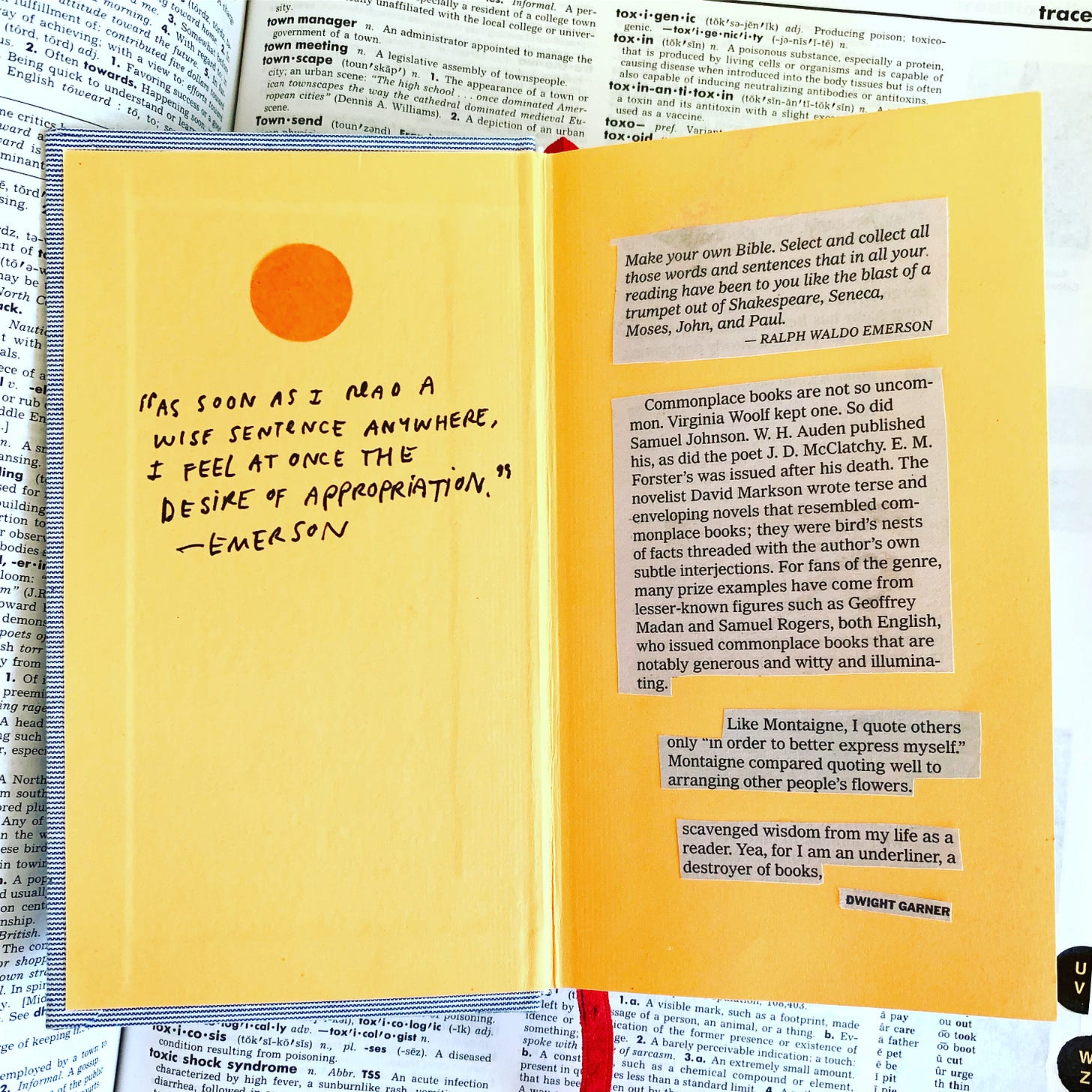
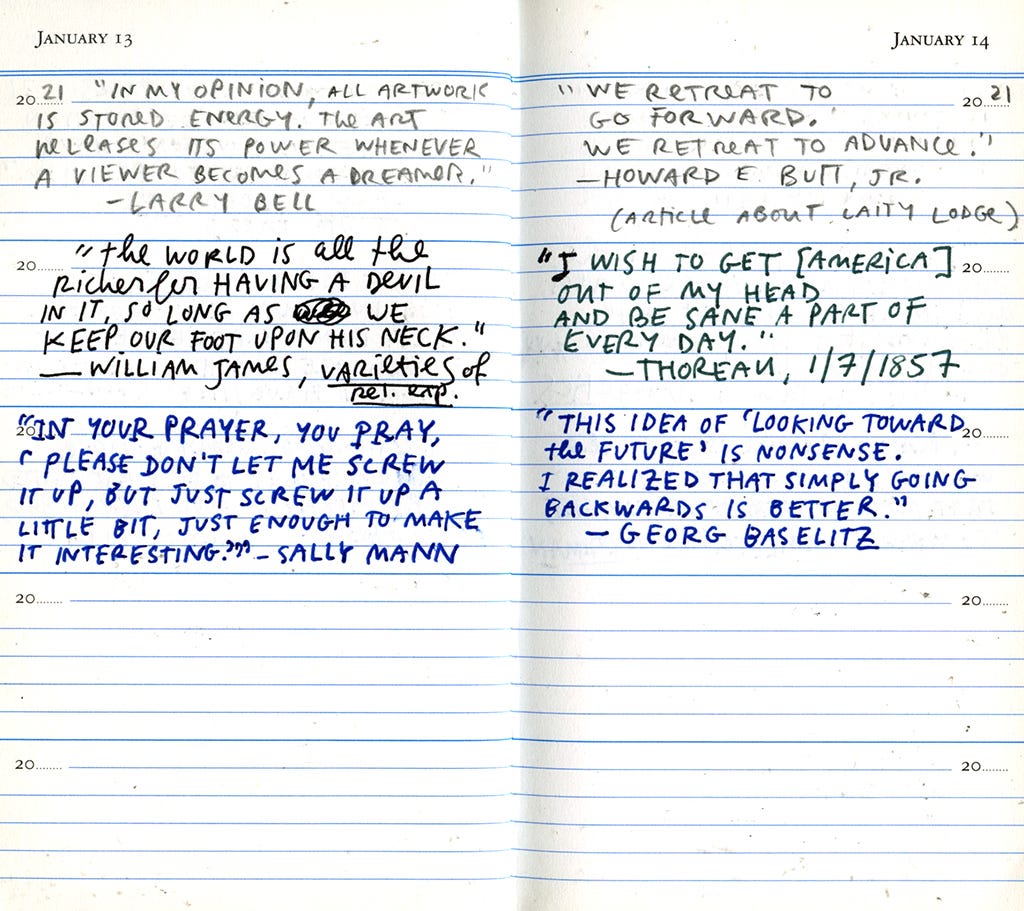
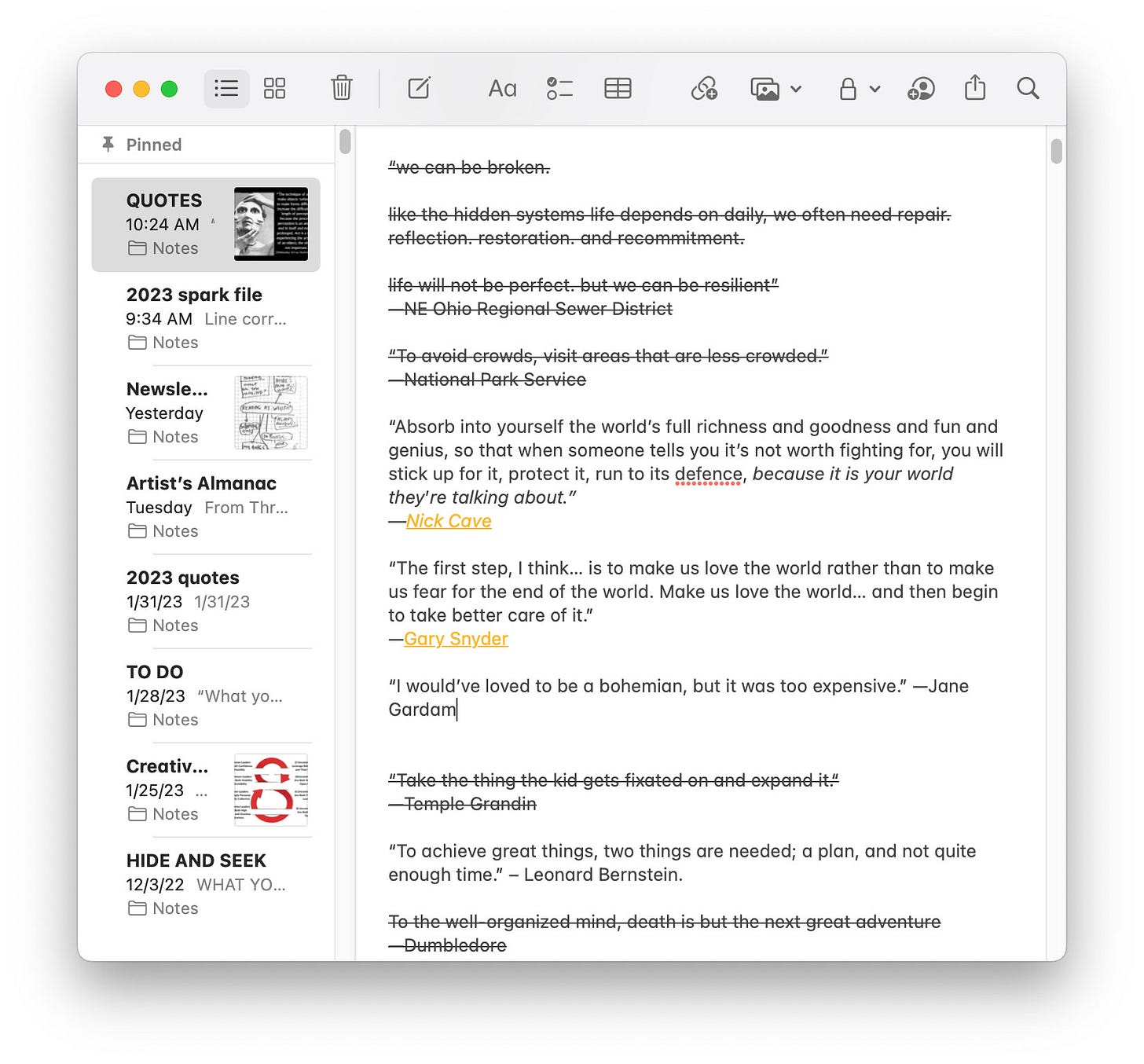
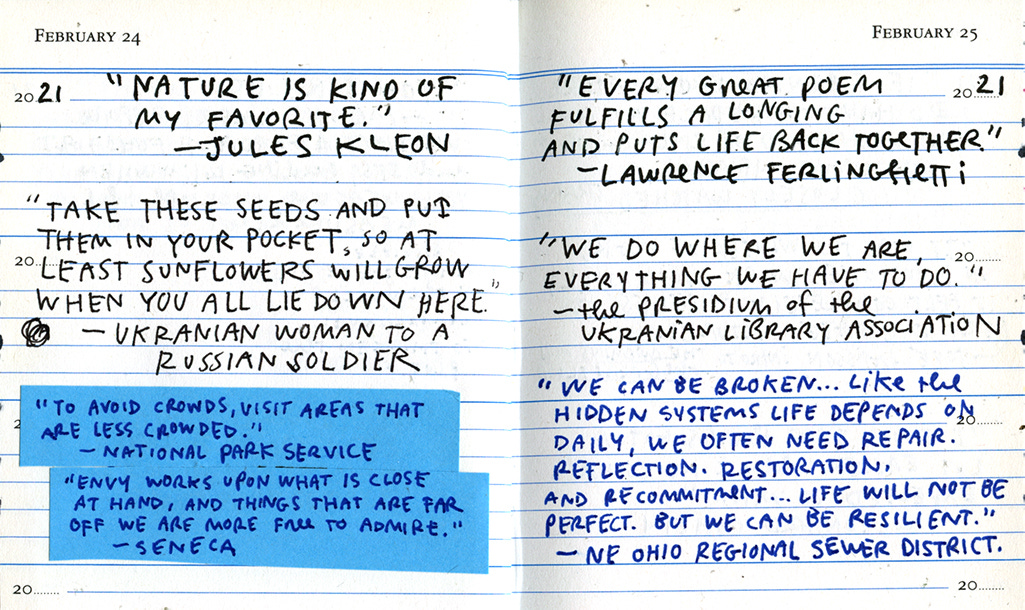
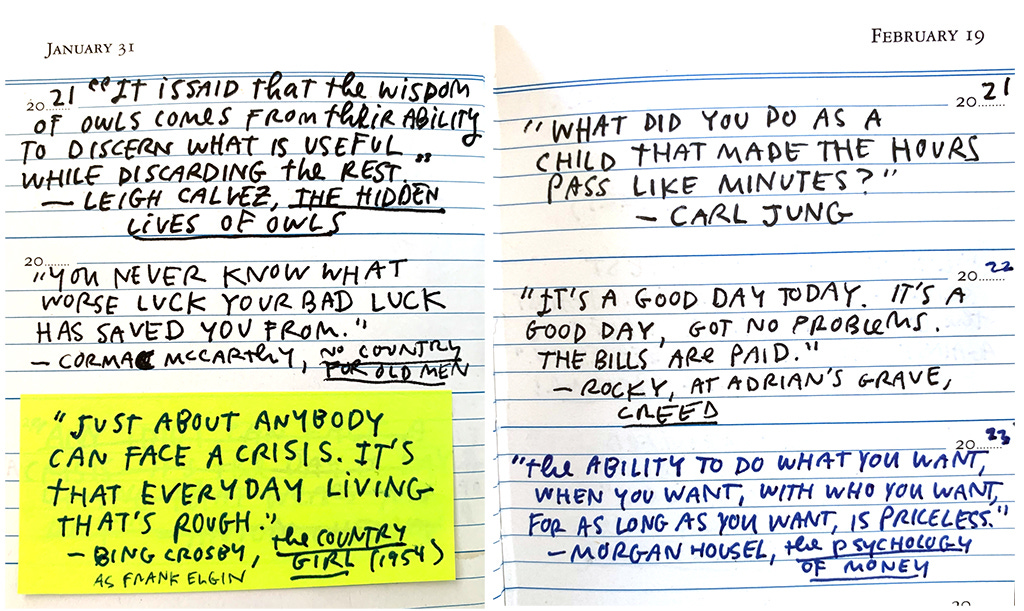
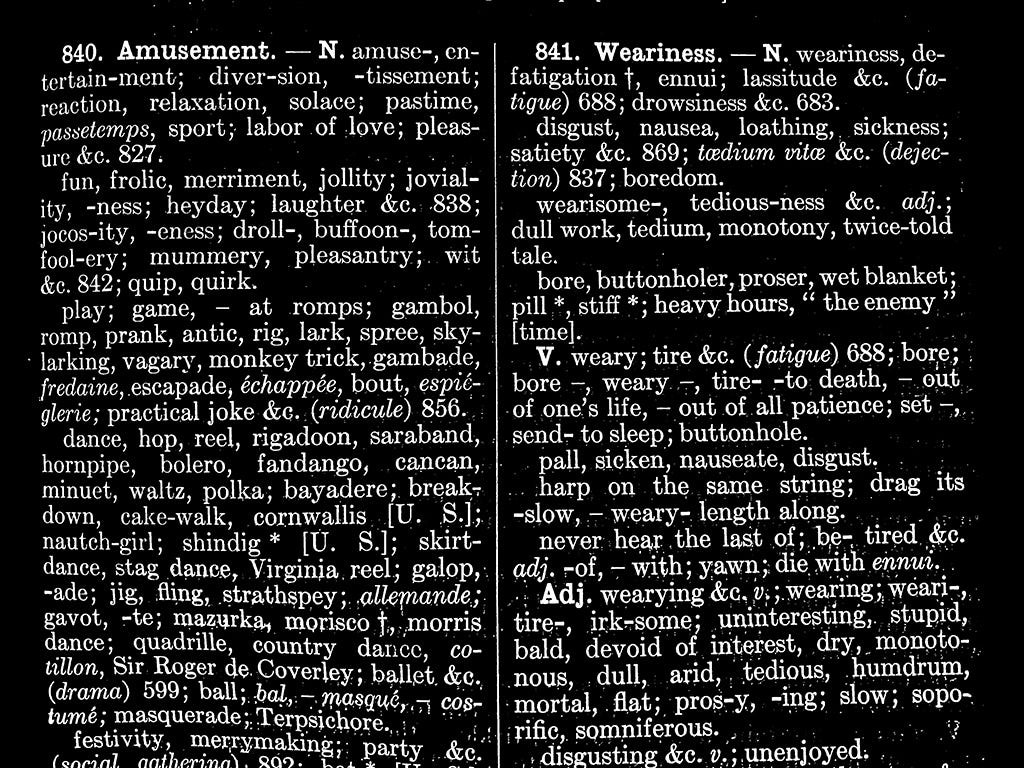

I keep a running powerpoint open on my laptop at all times. I call it "beautiful things and ideas". As I find things that touch me online, I copy and paste them into this powerpoint...images, poems, quotes, ideas, short biographies, etc. Every week on Sunday I go through and read and look at some of these beautiful things and am inspired. BTW, I also keep what I call my "daily commonplace sketchbook" in a notebook (with no lines). I put the date on each page and fill it with drawings and quotes, poems, questions that I would like to figure out the answer to. You have inspired me so much through the years, Austin. Thank you!
I noticed you have Jules in your diary, which I love. I like reading through my kid quote list better than my general one. It’s weirder. Here’s a favorite from my son when he was seven: "Horses like tater tots and zebras don't. That's how you can tell the difference." Their nonsense wouldn’t mean much to other people, but we really like it.